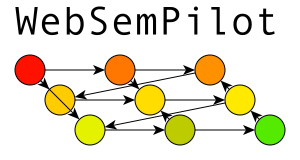
WebSemPilot: a project to pilot the interoperability of the API, library and software component related to semantic web technology. Application to agriculture and life sciences
Registration for the seminar and hackathon on 2 and 3 July 2024
The goal of WebSemPilot is to contribute to the definition of a corpus of API and reusable software components that exploit the technology related to the Semantic Web like OWL, SPARQL and RDF.
initial selected component (V0)
The goal of WebSemPilot is to contribute to the definition of a corpus of API and reusable software components that exploit the
technology related to the Semantic Web like OWL, SPARQL and RDF.
-
 Define a list of reusable components or API build by the community
Define a list of reusable components or API build by the community
-
 Propose guidelines to refactor /extends the components to extends their interoperability and usability
Propose guidelines to refactor /extends the components to extends their interoperability and usability
-
 Facilitate the integration of these building blocks within user targetted applications
Facilitate the integration of these building blocks within user targetted applications
The goals of WebSemPilot include:
Defining a Corpus of API and Reusable Software Components: The project aims to create a collection of reusable components and APIs that leverage Semantic Web technologies such as OWL, SPARQL, and RDF.
Guidelines for Interoperability and Usability: WebSemPilot intends to propose guidelines for refactoring and extending the selected components to enhance their interoperability and usability.
This involves establishing standards or best practices that developers can follow to ensure consistency and compatibility.
Facilitating Integration within User-Targeted Applications: The project seeks to build tools or mechanisms that ease the integration of these Semantic Web building blocks into applications targeted at end-users.
This could involve creating documentation, sample applications, or other resources to support developers in utilizing the components effectively.
The WebSemPilot project is useful for several reasons, particularly in the context of Semantic Web technologies. Here are some key benefits:
- Promoting Interoperability:
Semantic Web technologies involve standards like OWL (Web Ontology Language), SPARQL (Query Language for RDF), and RDF (Resource Description Framework).
By focusing on interoperability, WebSemPilot helps ensure that different components and APIs can work seamlessly together. This is crucial for creating a cohesive and integrated Semantic Web ecosystem.
-
Building a Reusable Component Corpus:
The project aims to define a corpus of reusable components and APIs.
This is beneficial because it encourages the development of standardized and modular building blocks. Developers can leverage these components to avoid reinventing the wheel, saving time and effort while fostering collaboration within the community.
-
Guidelines for Consistency and Compatibility:
Providing guidelines for refactoring and extending components helps maintain consistency across the Semantic Web ecosystem.
Consistent design patterns and practices make it easier for developers to understand, contribute to, and extend existing components. This, in turn, enhances the overall quality of the software.
-
Usability Improvements:
By addressing usability concerns, WebSemPilot makes Semantic Web technologies more accessible to a broader audience, including developers who may not be experts in the intricacies of Semantic Web standards.
Improved usability can lead to increased adoption and application of Semantic Web technologies in various domains.
-
Facilitating Integration into User Applications:
The project's focus on building tools to facilitate integration into user-targeted applications is valuable.
It helps bridge the gap between the low-level Semantic Web components and the end-user applications that leverage these technologies.
This can lead to the development of more user-friendly and feature-rich applications.
Community Collaboration: WebSemPilot is likely to foster collaboration within the Semantic Web community. By providing a platform for developers to contribute, share, and refine components, the project can accelerate innovation and advancements in Semantic Web technologies.
WebSemPilot is useful because it addresses critical challenges in the Semantic Web domain, such as interoperability, reusability, consistency, and usability.
By doing so, it has the potential to enhance the development and adoption of Semantic Web technologies, making them more accessible and practical for a wider range of applications and users.
Events
- Kick-off workshop 2024 - Rennes
- Integration of the Web Semantic technologies stack in agro / bio softwares using reusable components
- Spring 2024 - program soon
- Hackathons 2024 - hybrid
- starting using our components
- code integration use cases.
Provisional programme:
july 2nd
2pm: welcome
14h15:
Introduction to the Semantic Web for biological data
Olivier Dameron. University of Rennes
14h30: Exploiting knowledge graphs with SemGraph. Illustration at Data BNF: the Semantic Web at the Bibliothèque nationale de France
Xavier Garnier. Logilab
15h: Semantic Web at the heart of DATAtourisme, the nationwide open data platform for tourism data
Serwan Cravic. Conjecto
Break
4pm PO2/TransformON ecosystem for integrating data on transformation processes and the characterisation of food and bio-based products using the semantic web
Magalie Weber - INRAE
16:30 Olivier Filangi: Discovery: a software library for the development of decision support tools using RDF omics databases.
Olivier Filangi - INRAE
17h Mateo Boutet: Askomics: RDF data integration and SPARQL visual query interface
Matéo Boudet - INRAE
17:30 OWL as a pivot for model-oriented architectures with RDFObj, a python library for manipulating RDF data as object-oriented .
François Moreews - INRAE
July 3rd
Hackathon: 3 July (9am - 3pm), at Rennes -IRISA,
9am - 1pm
Generating a web interface for data exploration with Discovery
10.30am: break
10:45 - 12:30 :Python Askomics : Integration of user datasets and public databases with Askomics
12:30 - 1:00 pm lunch (tray lunch)
1pm - 3pm
Handling RDF datasets in Python, with or without SPARQL application to metabolism (BIOPAX) and genetic diseases ( DISGENET) . https://askomics.org/
The event will take place at IRISA in Rennes, Beaulieu campus :
IRISA

